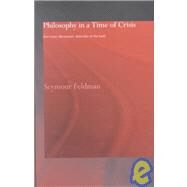Philosophy in a Time of Crisis: Don Isaac Abravanel: Defender of the Faith
, by Feldman,Seymour- ISBN: 9780700715909 | 0700715908
- Cover: Hardcover
- Copyright: 12/6/2002
The year 1492 marked the end of the Spanish-Jewish community. For centuries, Spanish Jews enjoyed material and cultural success, producing poets, philosophers, scientists and Torah scholars. Yet all this began to fall apart in the latter part of the 14th century with riots, forced conversions, economic and legal discrimination, ultimately culminating in expulsion. These external pressures produced internal confusion, resulting in wide-scale conversions and internal conflict between those who still continued the philosophical enterprise of Maimonides and those who believed that philosophy had undermined Jewish faith. One of the main leaders of Spanish Jewry, Don Isaac Abravanel, chose exile rather than conversion, and went to Italy where he took on a much different career. He now assumed the role of defending Judaism against its Christian critics and the radical Aristotelian misinterpretations of Jewish belief. Abravanel attempted to shore up Judaism by providing answers to the objections of theChristian theologians and the radical Aristotelians. He formulated a philosophy of Judaism that avoided the excesses of Aristotle and the obscurity of mysticism. This work presents a systematic exposition of Abravanel's defense of Judaism, wherein his views on the basic issues of medieval philosophy and theology are analyzed and evaluated. In addition, his philosophy is compared to that of his son Judah, whose though was deeply imbued with Renaissance Platonism. This cross-generational study illuminates the diversity of Sephardic culture as it moved into a new geographical and cultural climate. Students of both late medieval and Renaissance thought will find this comparative analysis of the Abravanels illustrative of the crises facing Spanish Jewry and some of the responses available to Jews as the entered the modern era.







